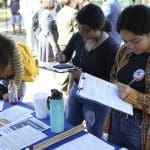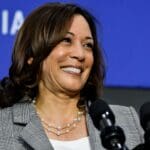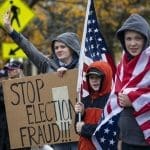At Jan. 6 vigil, Democratic lawmakers say voting rights are key to protecting democracy
Democrats called on the Senate to pass voting rights legislation to strengthen democracy.
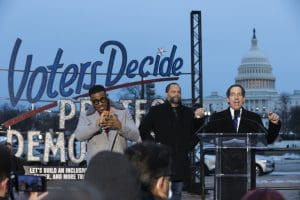
On Thursday evening, just as the sun began to dip below the horizon over the National Mall, hundreds of people gathered for a rally and candlelight vigil on the first anniversary of the deadly attack on the U.S. Capitol.
But the rally had another focus besides reflecting on the calamitous day that saw thousands of pro-Trump rioters storming the Capitol: Democratic lawmakers and activists were honoring democracy and acknowledging how it was threatened by the events of Jan. 6, 2021.
It had a specific and pointed message, directed not at former President Donald Trump or his big lie about “fraud” in the 2020 election that prompted the insurrection, but to the members of the U.S. Senate: Pass voting rights legislation now.
“I admit that the GOP have control over a lot of the levers of anti-democratic power in America, like the gerrymandering of Congressional districts, like the filibuster, and like all of their voter suppression tactics,” said Rep. Jamie Raskin (D-MD), who served as the lead manager of Trump’s second impeachment as a result of his role in inciting the Jan. 6 attack. “But none of them can beat the power of the organized people of the United States of America, in every state, in every county, and in the Congress.”
Raskin and fellow Reps. Eleanor Holmes Norton (D-DC), Pramila Jayapal (D-WA), and Veronica Escobar (D-TX), along with Sen. Chris Van Hollen (D-MD), gave speeches that riffed on the theme of perseverance in the face of a great challenge, and urged the importance of the Senate passing the Freedom to Vote Act and the John Lewis Voting Rights Advancement Act of 2021, named after the late congressman and civil rights icon.
The Freedom to Vote Act would expand early voting and make it easier to vote by mail. It would also make it easier for voters to comply with certain voter ID laws while adding new guidelines for drawing congressional districts and modifying campaign finance laws to counter the millions of dollars in “dark money” that flows into elections.
Meanwhile, the John Lewis Voting Rights Advancement Act of 2021 aims to restore some of what was lost when the Supreme Court struck down portions of the Voting Rights Act of 1965 with its historic decision in Shelby County v. Holder in 2013. Specifically, the bill aims to make states clear certain changes to their voting laws with the federal government, effectively adding a safeguard against GOP-controlled legislatures that want to make it harder for people to vote.
Both bills were passed in the House and await a vote in the Senate. Senate Majority Leader Chuck Schumer vowed earlier this week to fight efforts by Republicans to block the bills.
Van Hollen, who closed out the rally portion of the evening before a candlelight vigil and moment of silence, finished his speech by calling for an end to the filibuster rule, saying, “We need to pass the Freedom to Vote Act,” and adding that the Senate plans to vote on it before Martin Luther King Jr. Day on Jan. 17.
“Everybody needs to stand up and be counted in the light of day,” he said.
Norton used her time at the podium to remind the crowd of hundreds that what happened a year ago “was not only an attack on democracy but an attack on the District of Columbia.” She said D.C.’s lack of statehood ultimately led to a severe delay in response from the National Guard.
As it was the first anniversary of the insurrection attempt at the Capitol, some of the speakers recalled what they went through on that day.
Jayapal recalled how she was trapped in the House gallery when the rioters breached the Capitol entrance and “remembered the sound of the pounding of the gallery door” as she was crawling away to safety.
“I was one of the nearly two dozen members of Congress — all Democrats — who were trapped in the gallery after we had already been surrounded by the insurrectionists,” said Escobar. “After the attacks against our Capitol Police officers had begun, after the windows had been broken, and after we witnessed what would be unspeakable horrors against our country. It is a day I will never forget.”
In April, Escobar joined nine other Democrats in a civil lawsuit against Trump and his lawyer Rudy Giuliani for conspiring with right-wing extremist groups to incite the riot at the Capitol.
Toward the end of her remarks, Escobar told the crowd that Jan. 6 was the beginning of one of two paths for the future of the country.
“We are on a precipice right now and we have a choice to make as Americans: January 6 can either mark the end of our democracy,” she said, “or the beginning of our march toward the expansion of rights, and justice, and equity, and fairness for all.”
Published with permission of The American Independent Foundation.
Recommended
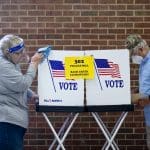
New group will advocate for increased voting access for Alabamians with disabilities
A national group focused on expanding access to the ballot box for those with disabilities is launching a chapter in Alabama.
By Ralph Chapoco, Alabama Reflector - April 22, 2024
Youngkin blocks Democratic bills dealing with elections
Vetoes affect ranked choice voting and voting rights lawsuits
By Graham Moomaw, Virginia Mercury - April 11, 2024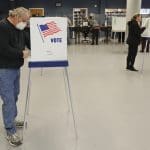
Lawmakers close in on online voter registration in New Hampshire
New Hampshire lawmakers are inching closer to creating a statewide election portal, a bipartisan proposal that would allow residents to register to vote online.
By Ethan DeWitt, New Hampshire Bulletin - March 15, 2024





